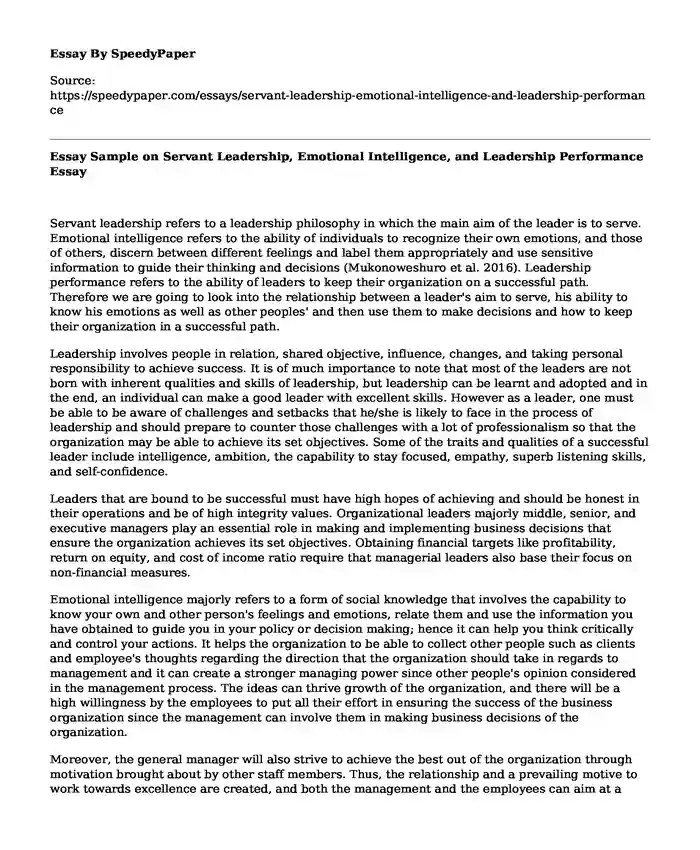
| Type of paper: | Case study |
| Categories: | Servant leadership Emotional intelligence |
| Pages: | 3 |
| Wordcount: | 703 words |
Servant leadership refers to a leadership philosophy in which the main aim of the leader is to serve. Emotional intelligence refers to the ability of individuals to recognize their own emotions, and those of others, discern between different feelings and label them appropriately and use sensitive information to guide their thinking and decisions (Mukonoweshuro et al. 2016). Leadership performance refers to the ability of leaders to keep their organization on a successful path. Therefore we are going to look into the relationship between a leader's aim to serve, his ability to know his emotions as well as other peoples' and then use them to make decisions and how to keep their organization in a successful path.
Leadership involves people in relation, shared objective, influence, changes, and taking personal responsibility to achieve success. It is of much importance to note that most of the leaders are not born with inherent qualities and skills of leadership, but leadership can be learnt and adopted and in the end, an individual can make a good leader with excellent skills. However as a leader, one must be able to be aware of challenges and setbacks that he/she is likely to face in the process of leadership and should prepare to counter those challenges with a lot of professionalism so that the organization may be able to achieve its set objectives. Some of the traits and qualities of a successful leader include intelligence, ambition, the capability to stay focused, empathy, superb listening skills, and self-confidence.
Leaders that are bound to be successful must have high hopes of achieving and should be honest in their operations and be of high integrity values. Organizational leaders majorly middle, senior, and executive managers play an essential role in making and implementing business decisions that ensure the organization achieves its set objectives. Obtaining financial targets like profitability, return on equity, and cost of income ratio require that managerial leaders also base their focus on non-financial measures.
Emotional intelligence majorly refers to a form of social knowledge that involves the capability to know your own and other person's feelings and emotions, relate them and use the information you have obtained to guide you in your policy or decision making; hence it can help you think critically and control your actions. It helps the organization to be able to collect other people such as clients and employee's thoughts regarding the direction that the organization should take in regards to management and it can create a stronger managing power since other people's opinion considered in the management process. The ideas can thrive growth of the organization, and there will be a high willingness by the employees to put all their effort in ensuring the success of the business organization since the management can involve them in making business decisions of the organization.
Moreover, the general manager will also strive to achieve the best out of the organization through motivation brought about by other staff members. Thus, the relationship and a prevailing motive to work towards excellence are created, and both the management and the employees can aim at a common goal (Daft, 2014). This factor influences one's ability to excel in coping with factors that affect business operations, both internally and externally. By a look from this perspective incorporates that "Servant leadership and emotional intelligence ascribes can play an essential role in building managerial leadership (Mukonoweshuro et al. 2016).
In conclusion, it is true as discussed above, that success of a business organization, therefore relies heavily on servant leadership and emotional intelligence. Since they entail detailed information on how a managerial leader can be groomed to enhance productivity, and management has to be careful of follower needs, respond and interact in a manner sensitively and know the benefits of creating productive relationships as a manager in the entire business.
Reference
Mukonoweshuro, J. Z., Sanangura, C., & Munapo, E. (2016). The role of servant leadership and emotional intelligence in managerial performance in a commercial banking sector in Zimbabwe. https://businessperspectives.org/images/pdf/applications/publishing/templates/article/assets/7854/BBS_en_2016_03_Mukonoweshuro.pdf
Daft, R. L. (2014). The leadershi/p experience. Cengage Learning. https://ir-library.ku.ac.ke/bitstream/handle/123456789/19342/Strategic%20leadership%20and%20organizational%20performance%20of%20tea%E2%80%A6.pdf?sequence=1
Cite this page
Essay Sample on Servant Leadership, Emotional Intelligence, and Leadership Performance. (2022, Feb 16). Retrieved from https://speedypaper.net/essays/servant-leadership-emotional-intelligence-and-leadership-performance
Request Removal
If you are the original author of this essay and no longer wish to have it published on the SpeedyPaper website, please click below to request its removal:
- Essay Example on Pipeline Infrastructure Monitoring
- Free Essay on Gun Violence on College Campuses
- Free Essay on the Telecommunications and Media Company: Telstra's Global Strategy
- Free Essay with a Speech Sample Dedicated to Diabetes
- Essay Sample on Why Australian Banks Came Out Strong from the Global Financial Crisis
- The History of the University of Arizona
- Paper Example. How People Can Practice Common Sense
Popular categories




